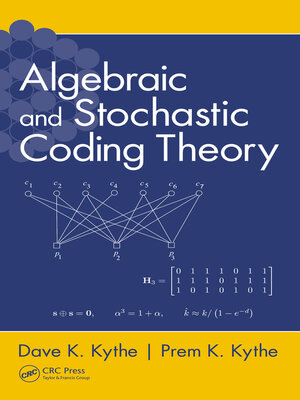
Sign up to save your library
With an OverDrive account, you can save your favorite libraries for at-a-glance information about availability. Find out more about OverDrive accounts.
Find this title in Libby, the library reading app by OverDrive.



Search for a digital library with this title
Title found at these libraries:
| Library Name | Distance |
|---|---|
| Loading... |
Using a simple yet rigorous approach, Algebraic and Stochastic Coding Theory makes the subject of coding theory easy to understand for readers with a thorough knowledge of digital arithmetic, Boolean and modern algebra, and probability theory. It explains the underlying principles of coding theory and offers a clear, detailed description of each code. More advanced readers will appreciate its coverage of recent developments in coding theory and stochastic processes.
After a brief review of coding history and Boolean algebra, the book introduces linear codes, including Hamming and Golay codes. It then examines codes based on the Galois field theory as well as their application in BCH and especially the Reed–Solomon codes that have been used for error correction of data transmissions in space missions.
The major outlook in coding theory seems to be geared toward stochastic processes, and this book takes a bold step in this direction. As research focuses on error correction and recovery of erasures, the book discusses belief propagation and distributions. It examines the low-density parity-check and erasure codes that have opened up new approaches to improve wide-area network data transmission. It also describes modern codes, such as the Luby transform and Raptor codes, that are enabling new directions in high-speed transmission of very large data to multiple users.
This robust, self-contained text fully explains coding problems, illustrating them with more than 200 examples. Combining theory and computational techniques, it will appeal not only to students but also to industry professionals, researchers, and academics in areas such as coding theory and signal and image processing.






